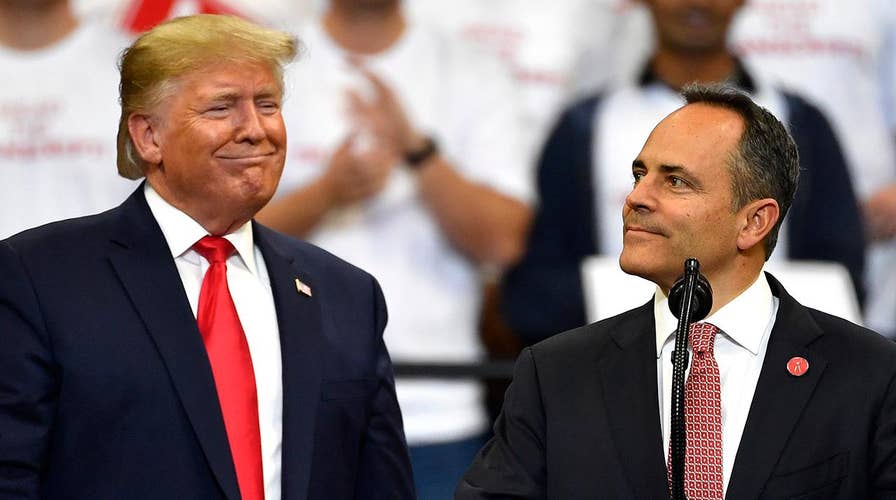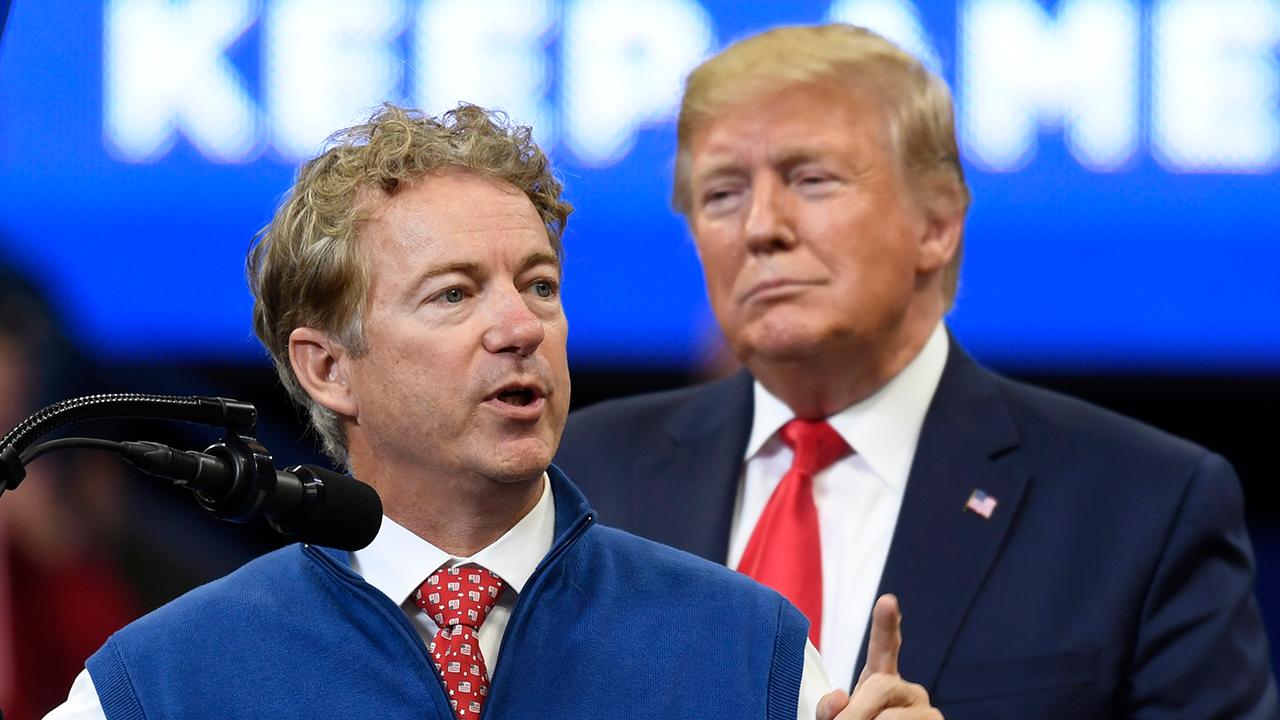Republican Matt Bevin nationalized Kentucky's gubernatorial race
Bevin synched up with President Trump, hitting hard on issues like abortion and immigration; senior correspondent Mike Tobin reports from Louisville, Kentucky.
Republican incumbent Gov. Matt Bevin refused to concede late Tuesday in Kentucky's gubernatorial race, citing unspecified "irregularities" -- potentially kickstarting weeks of uncertainty as the closely-watched contest with national implications remains too close to call.
Meanwhile, Democratic Attorney General Andy Beshear held a press conference Wednesday morning in Louisville, declaring victory by saying, “Last night, the election ended. It ended and it’s time to move forward with a smooth transition.”
With 100 percent of precincts reporting, Bevin was behind Beshear by 5,333 votes out of more than 1.4 million counted, 49.2 percent to 48.8 percent. Libertarian candidate John Hicks received 2 percent.
The Associated Press said it could not declare a winner, owing to the tight margin. The Democratic National Committee and Beshear's campaign, however, claimed victory.
"My expectation is that he [Bevin] will honor the election that was held tonight," Beshear said in a speech to supporters Tuesday. "That he will help us make this transition. And I'll tell you what, we will be ready for that first day in office, and I look forward to it."
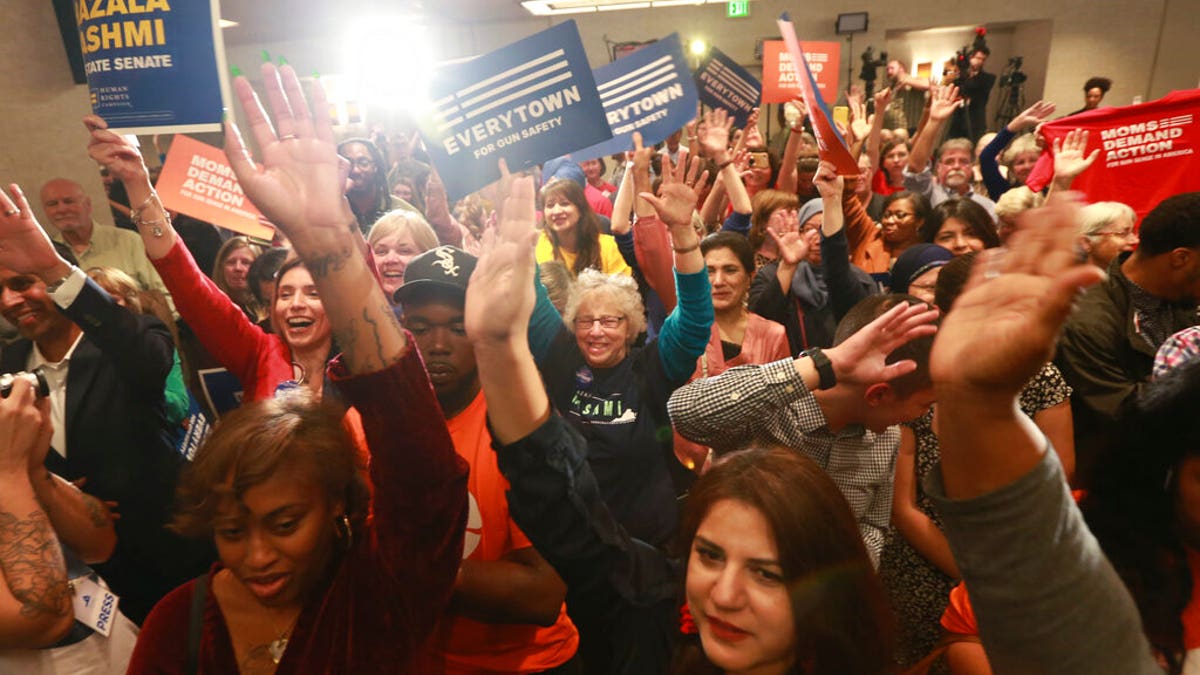
Democratic supporters cheer their candidates at a Democratic Party event in Richmond, Va., Tuesday, Nov. 5, 2019. All seats in the Virginia House of Delegates and state Senate are up for election. (AP Photo/Steve Helber)
And Democrat Amy McGrath, who is running in a long-shot bid to unseat GOP Senate Majority Leader Mitch McConnell in 2020, said simply: "All I have to say is: Mitch, you’re next."
Bevin, however, called it a "close, close race" and said he wasn't conceding "by any stretch." He added, "We want the process to be followed, and there is a process." On Monday, Trump had called on an "angry majority" of voters to boost the relatively unpopular Bevin in Kentucky, in a nod to Richard Nixon's "silent majority" and Ronald Reagan's "moral majority."
The history-making evening also saw Republicans decisively hold onto the governorship in Mississippi despite a fierce Democratic challenge, while electing Kentucky’s first black attorney general. Democrats, meanwhile, took complete control over the Virginia statehouse for the first time in 26 years.
Although Bevin has not outlined his next steps, Kentucky law provides for a variety of possible avenues. There is no mandatory recount law in Kentucky. Bevin may request counties recanvass their results, which is not a recount, but rather a check of the vote count to ensure the results were added correctly. Bevin would need to seek and win a court's approval for a recount.
Bevin could also mount a legal challenge to the election results, assuming he could identify sufficient grounds. Such a move could expose Bevin to criticism that, like defeated Georgia Democratic gubernatorial candidate Stacey Abrams, he was refusing to accept the legitimate result of an election. (Abrams lost by 50,000 votes, a much larger margin than Bevin's current deficit.)
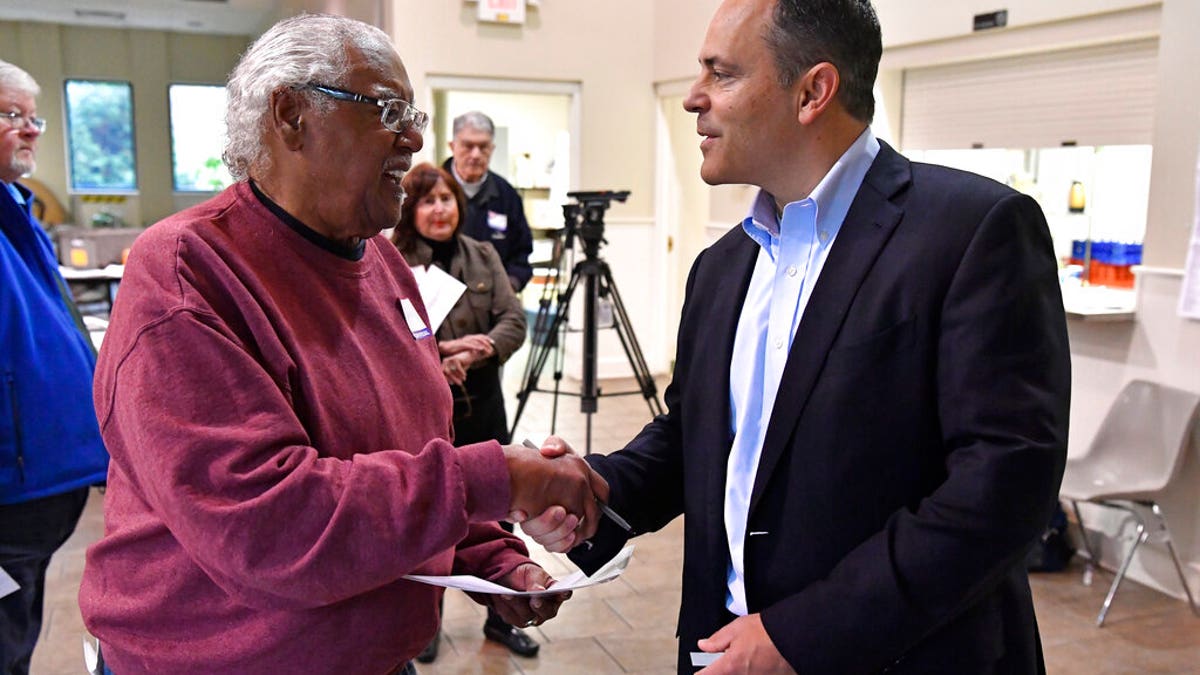
Kentucky Governor and Republican gubernatorial candidate Matt Bevin, right, shakes hands with a poll worker after casting his ballot in the state's general election in Louisville, Ky., Tuesday, Nov. 5, 2019. (AP Photo/Timothy D. Easley)
Regardless of the final outcome, the razor-thin margin in the race did not come as a surprise to Republicans. Although Trump carried deep-red Kentucky by 30 points in the 2016 presidential election, Bevin has long been very unpopular for a Republican in the state, owing in part to his numerous spats with striking public school teachers and his plan to address a growing pension crisis.
Bevin significantly underperformed the rest of the GOP ticket on the ballot in Kentucky on Tuesday, as Republican candidate Daniel Cameron handily won his race to become the state's next attorney general. Cameron made history as the first African-American to be elected Kentucky Attorney General and the first Republican to hold the post in more than 70 years.
In a strong indicator that Bevin is unpopular among Kentuckians, Cameron received 774,864 votes in his 15-percentage-point win -- while Bevin garnered only approximately 700,000 votes for his marquee gubernatorial bid. It is highly unusual for down-ballot races to attract more voter interest than gubernatorial contests.
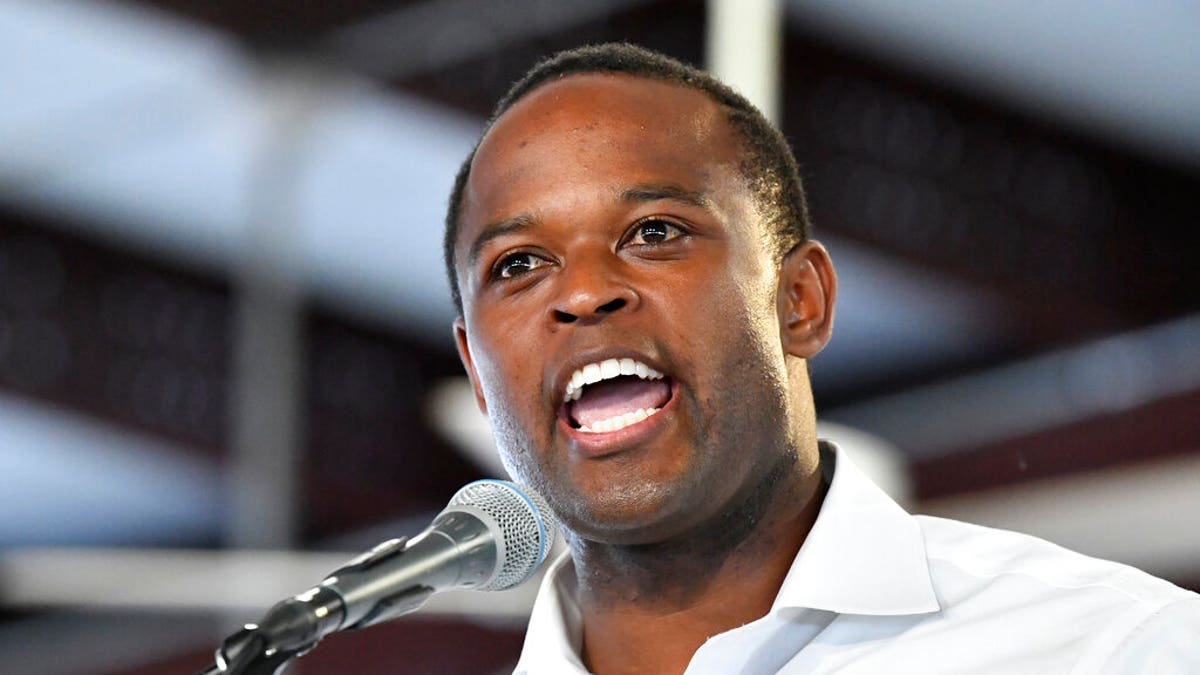
Republican Daniel Cameron was elected the state's first-ever black Attorney General on Tuesday. (AP Photo/Timothy D. Easley, File)
Meanwhile, Republican attorney and former elections board member Michael Adams was easily elected as Kentucky’s next secretary of state, and Republican Mike Harmon was re-elected as Kentucky auditor. Additionally, Republican Ryan Quarles was re-elected as Kentucky commissioner of agriculture, and GOP incumbent Allison Ball won a second term as Kentucky’s treasurer.
Those results -- and Bevin's unique vulnerabilities -- led Republicans to dismiss claims that the gubernatorial race had any meaningful national implications.
DEMS SWEEP VIRGINIA STATE HOUSE, SENATE ELECTIONS, CAPPING STATE'S DRAMATIC LEFTWARD SHIFT
“President Trump’s rally helped five of six Kentucky Republicans win clear statewide victories, including Attorney General-elect Daniel Cameron, who will be the first black A.G. in Kentucky history and the first Republican to hold the office since 1948," Brad Parscale, Trump's 2020 campaign manager, said in statement to Fox News late Tuesday. "The President just about dragged Gov. Matt Bevin across the finish line, helping him run stronger than expected in what turned into a very close race at the end. A final outcome remains to be seen.”
Commentator Philip Klein noted that Beshear's Democratic father won the governorship in Kentucky by strong margins in 2011, just a year before Republican presidential candidate Mitt Romney carried the state by double-digits.
However, in what could be a worrying sign for Republicans in the long term, Bevin underperformed in Northern Kentucky, typically a GOP stronghold, and among suburban voters in several counties outside of Cincinnati.
Apparently aware of his problems with voters, Bevin had remarked in February, "There has never been a poll ever taken since I’ve been a candidate or since I’ve been governor ... that has ever found me above water on anything or likely to win anything, ever. ... Polls, shmolls."
"Polls, shmolls."
Calling health care a "basic human right," Beshear supports inserting the federal Affordable Care Act's consumer protections into state law. He also vowed to rescind Bevin's efforts to require some "able-bodied" Medicaid recipients to get a job, go to school or volunteer to keep their benefits.
Beshear, whose father set federal health care reform into motion in Kentucky when he was governor, said at least 95,000 people would lose coverage if Bevin's work requirements became law. A federal judge blocked the work requirements, and Bevin's administration is appealing.
Also on Tuesday, Virginia Democrats took control of the state Senate and state House, as the state continues its dramatic leftward shift. The GOP had a slim majority in each chamber going into Tuesday's elections.
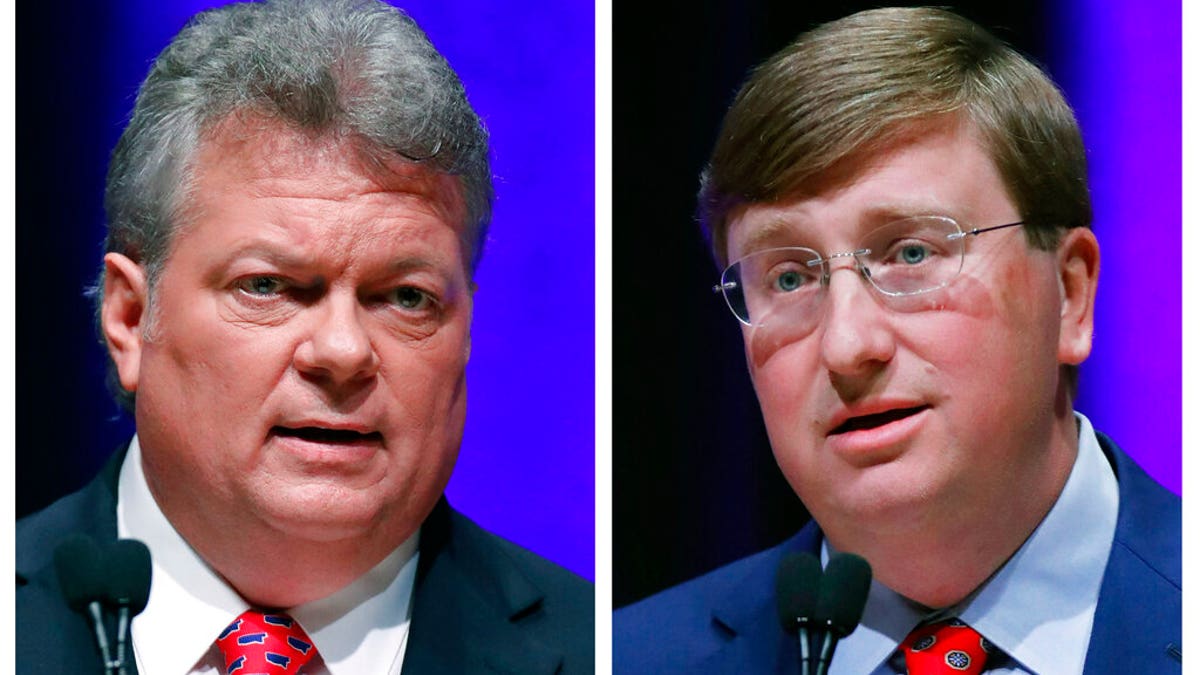
This combination image of Oct. 10, 2019, file photos shows Democratic State Attorney General Jim Hood, left, and Republican Lt. Gov. Tate Reeves during the first televised gubernatorial debate at the University of Southern Mississippi in Hattiesburg, Miss. (AP Photo/Rogelio V. Solis, File)
Democrats in Virginia now control both the executive mansion and the General Assembly for the first time in more than two decades. Outside groups and political parties in Virginia had been test-driving expensive campaigns for months to win over and motivate voters in a state that was until recently considered a presidential battleground.
Of the four states holding legislative elections this year, Virginia was the only one with control of the statehouse up for grabs. Virginia has been trending blue for years thanks to growth in more diverse, liberal suburbs and cities, and population declines in more rural, conservative areas.
Gov. Ralph Northam, a Democrat, was not up for reelection Tuesday but had been actively campaigning for his party's candidates after bouncing back from a near politically fatal blackface scandal earlier this year.
Over in Mississippi, GOP candidate Tate Reeves soundly defeated Democratic rival Jim Hood. With 99 percent of precincts reporting, Reeves was ahead 52.3 percent (442,444 votes) to 46.5 percent (393,520 votes).

Kentucky Attorney General and Democratic Gubernatorial candidate Andy Beshear studies his ballot at the Knights of Columbus polling location Tuesday, Nov. 5, 2019, in Louisville, Ky. Kentucky's voters are now deciding the political grudge match between Republican Gov. Matt Bevin and Beshear. (AP Photo/Bryan Woolston)
Hood, the attorney general, had been seeking to become the second Democratic governor in the Deep South. Reeves, who got campaign help from both Trump and Vice President Mike Pence, is currently lieutenant governor. The president visited the state on Tuesday.
Reeves will succeed term-limited Republican Gov. Phil Bryant.
"President Trump’s rally and endorsement in Mississippi undoubtedly had an impact and helped Governor-elect Tate Reeves nail down his victory," Parscale told Fox News. "Governor Reeves will be a tremendous conservative leader for Mississippians in fighting for freedom and keeping taxes low. He will also be a key ally as 2020 approaches and President Trump continues building momentum for re-election.”
Democrats saw Hood as their strongest nominee in nearly a generation in a conservative state where Republicans have been governor for 24 of the past 28 years.
There were concerns in advance of the race that Mississippi's Jim Crow-era election process could have made the election difficult to decide. The state's 1890 constitution requires a statewide candidate to win a majority of both the popular vote and an electoral vote, with one electoral vote awarded to the top vote-getter in each of 122 state House districts.
If nobody had won both, the election would have been decided by the state House, now controlled by Republicans.
Headlining a fired-up rally at Rupp Arena in Lexington on Monday night, Trump jokingly acknowledged that the elections could be seen as a barometer of his popular support amid Democrats' impeachment inquiry.
If Republicans triumphed, Trump remarked, the media would cover it as a "ho-hum" event -- but if Democrats won, the day would be portrayed as a major loss for the White House.
"You can't let that happen to me!" Trump said, laughing.
Top Democrats have acknowledged that Trump's influence helped the GOP sweep key House special elections in North Carolina in September.
But, Democrats' ongoing impeachment inquiry has blunted some of the president's momentum. Tuesday's races were voters' first major opportunity to cast ballots since the probe began.
Another key race is coming up: The lone Democratic governor in the Deep South, Louisiana's John Bel Edwards, is in a Nov. 16 runoff as he seeks a second term. Trump is set to headline a rally in Monroe, Louisiana, on behalf of GOP candidate Eddie Rispone on Wednesday.
The Louisiana race has become heated in recent days, with Rispone unloading on John Bel Edwards in personal terms and claiming he's soft on crime.
“Rispone is doing what he’s got to do,” Roy Fletcher, a veteran Republican consultant, told The Advocate. “He knocked the piss out of [Rep. Ralph] Abraham," who ran in the gubernatorial primary but didn't qualify for the runoff.
But the race's tough rhetoric pales in comparison to the tension that marked the Kentucky contest. Bevin drew perhaps his harshest criticism when he lashed out at teachers who used sick days to go on strike. In 2018, Bevin asserted without evidence that an unidentified child who had been left home alone somewhere in the state had been sexually assaulted on a day of mass school closings as teachers rallied.

President Donald Trump speaks during a campaign rally in Lexington, Ky., Monday, Nov. 4, 2019. (AP Photo/Susan Walsh)
He apologized but doubled down earlier this year by connecting a girl's shooting in Louisville with school closings caused by teacher protests.
“Bevin wants to be bailed out by President Trump, who won the state by a mile in 2016, and it seems like he is bringing up impeachment about every chance he can get,” said Fox News’ anchor and chief national correspondent Ed Henry.
ILHAN OMAR CALLS FOR 'MASS MOVEMENT' OF THE WORKING CLASS, AS CROWD CHANTS 'LOCK HIM UP'
And Beshear, the son of Kentucky's last Democratic governor, countered Bevin's campaign with a disciplined campaign style that stressed what he called "kitchen table" issues — education, jobs and health care. He exploited Bevin's combative style, branding the governor as a bully for a running feud with teachers who opposed his efforts to revamp the state's woefully underfunded public pension systems.
Leah Askarinam, a reporter and analyst with the nonpartisan newsletter Inside Elections, noted that even in these increasingly partisan times, voters in states like Kentucky are "willing to cross party lines when it comes to governance of their specific states."
"Gubernatorial candidates can campaign on issues that are state-specific like the state's budget and education funding -- and they can cross party lines without facing the same kind of political pressure as Senate candidates who have to work with a national legislature," Askarinam said. "We've seen candidates like John Bel Edwards support state policies that limit abortion access, for example, which is a much more difficult stance to take as a Democrat in the Senate."
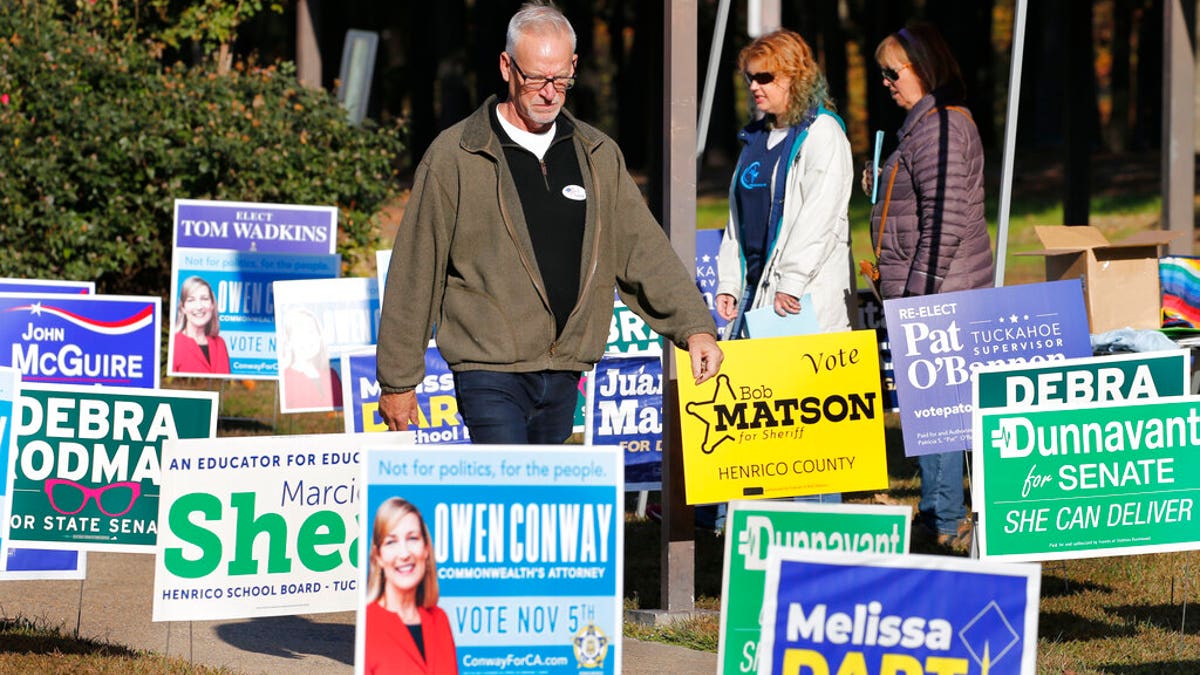
Voters walk through a sea of campaign signs at a polling station in Richmond, Va., Tuesday, Nov. 5, 2019. All seats in the Virginia House of Delegates and State senate are up for election. (AP Photo/Steve Helber)
The Kentucky election was to settle a bitter rivalry that stretched from the statehouse to courtrooms and finally to the campaign. Wielding his authority as the state's top lawyer, Beshear filed a series of lawsuits challenging Bevin's executive actions to make wholesale changes to boards and commissions and sought to block Bevin-backed pension and education initiatives. In the highest-profile case, a Beshear lawsuit led Kentucky's Supreme Court to strike down a Bevin-supported pension law on procedural grounds last year.
Bevin ramped up the rivalry by frequently attacking Beshear and his challenger's father in deeply personal terms. Beshear's father, former two-term Gov. Steve Beshear, preceded Bevin in office.
CLICK HERE TO GET THE FOX NEWS APP
Andy Beshear took a shot at Bevin on Tuesday after Trump's visit.
"He had to have someone come to town for him, because he knew he couldn't win it on his own merits," Beshear said.
Fox News' Jim Murphy, Michael Tobin, Paul Steinhauser and The Associated Press contributed to this report. A previous version of this article included descriptions of Kentucky election law and election procedure from the Election Law Society blog maintained by University of Kentucky College of Law Professor Joshua Douglas.








































